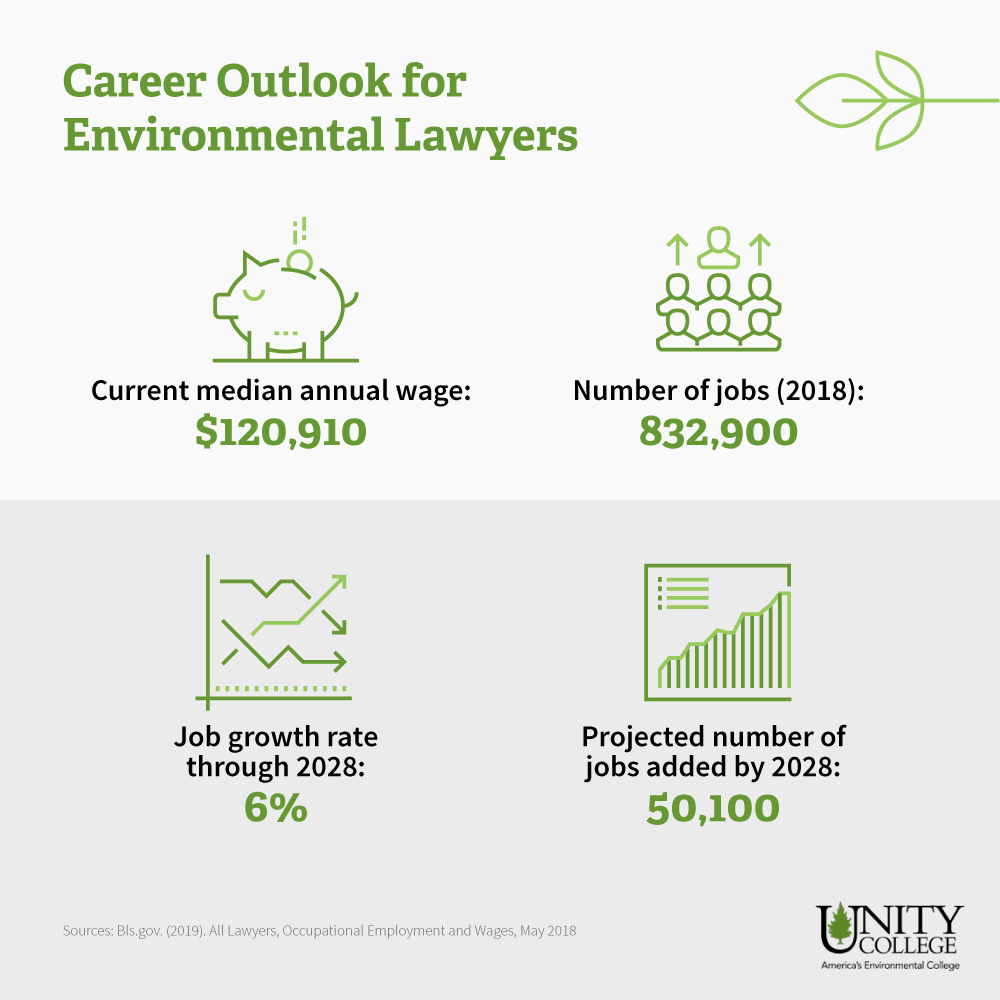Do Environmental Lawyers Make Good Money
Environmental lawyers are important advocates to individuals, corporations, and government agencies, often acting as a mediator and providing counsel. When thinking about pursuing a career as an environmental lawyer, there are many things to consider. What are the educational requirements? How much do environmental lawyers make? How does a fresh graduate start out?
- What is an Environmental Lawyer?
- Key Tasks & Duties
- Work Environments
- Salaries
- Job Outlook & Growth Rate
- Educational Requirements
- Additional Certifications
- Related Degrees

Environmental Lawyer Fast Facts
| Education Requirements | 4-Year Bachelor's Degree & 3-Year Juris Doctor (JD) |
| Recommended Degree Program | B.A. in Environmental Policy, Law, and Society |
| Average Salary (2018) | $120,910 (average for all lawyers) |
| Lawyers Employed in U.S. (2018) | 823,900 |
| Projected Job Openings by 2028 | 50,100 |
| Projected Growth Rate | 6% (As fast as average) |
| Other Job Titles | Environmental and Natural Resources Associate Attorney |
| Related Careers | Conservation Officer |
What is an Environmental Lawyer?
An environmental lawyer may work with a variety of clients from individuals to large corporations to government agencies.
They focus on environmental rights and laws and may work on projects relating to renewable energy, sustainability, and climate change. A successful environmental lawyer will have many skills including research, analysis, negotiation, and both written and verbal communication.
What Do Environmental Lawyers Do?
What does an environmental lawyer do? The day in the life of an environmental lawyer can vary depending on the type of organization the lawyer works in. Environmental lawyers have many responsibilities that range from research to meeting with clients to court proceedings. An environmental attorney may work with individuals, businesses, and government entities.
Junior Environmental Lawyer duties
An environmental lawyer job description typically includes the following responsibilities.
- Analyze data from findings, cases, trials, and other sources
- Advocate for environmental regulations and protections
- Create legal correspondence and other documentation
- Recommend corrective action and fines for offenders
- Effectively communicate how an event or plan may negatively impact humans or wildlife
- Provide counsel to clients
- Determine if there is enough evidence to represent a business, individual, or government agency
- Assess damages and impact from an event
- Interview clients and other people of interest to compile evidence to develop a case
- Effectively and persuasively present evidence and other findings at trial
Senior Environmental Lawyer duties
In addition to tasks handled by junior or mid-level environmental lawyers, senior lawyers may also be expected to handle the following responsibilities.
-
- Provide legal advice and assistance to investigators during criminal investigations
- Support and mentor junior environmental lawyers
- Provide legal and policy counsel to corporations, agencies, and other entities
- Act as a mediator between landowners and businesses or government agencies
- Draft environmental policies and business practices
- Validate written legal documentation
- Organize and participate in educational campaigns and lobbying efforts
- Create clear written communication to stakeholders and interested public parties
- Consult and advise agencies, researchers, scientists, and individuals
- Encourage public engagement by organizing environmental advocacy programs and forums
Where Do Environmental Lawyers Work?
There are many types of environmental law careers. Environmental lawyers may work in a variety of fields and entities, including various specialist law firms. Many who consider becoming this type of lawyer wonder, "Do environmental lawyers travel?" Most lawyers work in an office environment, though some travel may be required if they choose to teach at a university.

Depending on the type of environmental clients they represent, some local travel may be necessary to court proceedings and client meetings. It is important for environmental lawyers to have flexible schedules because long hours are often required.
Environmental Lawyers Average Salary
How much does an environmental lawyer make a year? An environmental lawyer's average salary is about $120,910 per year. The salary can vary based on location, experience, and level of education.
Junior Environmental Lawyer Salary
The environmental lawyer starting salary of a recent graduate is lower than that of a senior-level position. This is due to a lack of experience first starting out. The starting salary is generally around $60,000 a year, depending on the job location.
Senior Environmental Lawyer Salary
As an environmental lawyer progresses in their career, gaining experience and expertise, their salary will also increase. The environmental attorney salary for a senior-level lawyer is generally upwards of $100,000, depending on the job location.
Environmental Lawyer Job Outlook
The demand for environmental lawyers is growing about as fast as average with a 6% growth expected over the next 10 years. Approximately 50,100 environmental lawyer jobs will be added by 2028.
In the chart below, salary data is broken down by state based on data from 2018.
-
State Low Salary Median Salary High Salary Alabama $49,310 $100,530 $204,340 Alaska $73,940 $111,530 $164,110 Arizona $64,020 $111,590 $208,000+ Arkansas $46,950 $82,570 $164,020 California $71,020 $152,930 $208,000+ Colorado $66,650 $127,070 $208,000+ Connecticut $70,810 $129,160 $208,000+ Delaware $68,110 $113,170 $208,000+ Florida $51,550 $100,090 $208,000+ Georgia $50,060 $104,940 $208,000+ Hawaii $64,720 $97,270 $168,870 Idaho $50,460 $81,870 $170,010 Illinois $59,210 $126,770 $208,000+ Indiana $52,140 $91,890 $204,210 Iowa $49,670 $94,260 $200,970 Kansas $45,080 $82,990 $203,590 Kentucky $47,820 $77,310 $176,020 Louisiana $46,990 $90,470 $181,510 Maine $51,260 $88,140 $197,420 Maryland $53,390 $107,450 $208,000+ Massachusetts $68,940 $142,100 $208,000+ Michigan $53,710 $94,990 $183,410 Minnesota $55,730 $103,630 $204,050 Mississippi $22,360 $85,970 $172,670 Missouri $52,780 $99,990 $194,120 Montana $47,090 $74,510 $136,670 Nebraska $54,490 $93,280 $178,290 Nevada $73,260 $121,740 $208,000+ New Hampshire $60,770 $99,250 $208,000+ New Jersey $67,260 $119,540 $208,000+ New Mexico $56,140 $87,530 $180,300 New York $65,800 $144,150 $208,000+ North Carolina $50,350 $99,400 $208,000+ North Dakota $57,910 $92,500 $174,570 Ohio $50,870 $98,530 $208,000+ Oklahoma $46,100 $90,980 $208,000+ Oregon $60,260 $107,560 $188,130 Pennsylvania $53,980 $116,860 $208,000+ Rhode Island $68,350 $103,920 $203,710 South Carolina $44,380 $80,990 $198,300 South Dakota $54,770 $82,560 $207,620 Tennessee $55,210 $99,600 $208,000+ Texas $63,680 $127,550 $208,000+ Utah $52,700 $97,010 $189,680 Vermont $52,690 $87,310 $187,230 Virginia $60,900 $127,110 $208,000+ Washington $68,300 $115,500 $208,000+ West Virginia $51,620 $85,190 $160,890 Wisconsin $57,060 $103,490 $208,000+ Wyoming $55,500 $80,970 $194,570 Environmental Lawyer Education Requirements
How long does it take to become an environmental lawyer? It typically takes about 7 years to become an environmental lawyer. Educational environmental lawyer requirements include a bachelor's degree and a law degree, typically a Juris Doctor (JD).
Upon graduating, the bar exam must be completed successfully. Those seeking a more senior or specialized role after graduating from law school may consider a post-graduate program.
High School Recommendations
High school students interested in pursuing a career in environmental law may consider taking an elective course in ecology or environmental science. Some programs may offer or even require an externship where students can gain hands-on experience in the field.
Undergraduate Environmental Law Programs
A bachelor's degree is required in order to be admitted into law school. There isn't a specific program of study that is required, however, students may consider seeking a degree in environmental policy, environmental science, business management, or government.
Programs pertaining to these subjects may help students as they apply to the best environmental law schools. Schools for environmental careers can be a great place to develop an understanding of topics like environmental justice, energy and the environment, and environmental and natural resources.
Postgraduate Environmental Law Programs
After completing a 4-year bachelor's degree program, aspiring environmental lawyers must go to law school. It typically takes three years to complete law school and receive a Juris Doctor (JD). Often, entry to the top law schools will also require passing a law school admission test.
Post-graduate students may consider continuing their education to receive a Masters of Law, Masters of Environmental Law, or a Ph.D. Masters or doctorate programs to consider include oil and gas law, land use, and air quality control. Environmental lawyers with a master's or doctor's degree often receive higher pay and may be eligible for senior-level positions.
Additional Certifications
In addition to a degree, the completion of the LSAT and bar exam are required environmental lawyer qualifications. The LSAT is an exam that takes half a day to complete. It tests critical thinking and reasoning skills. A passing score is required to be accepted into law school.
After completing law school, lawyers must become licensed. To become licensed, the state bar exam must be passed. The format of the bar exam varies by state. There are many prep courses and resources that students can use to prepare.
Work Experience for Environmental Lawyers
Many companies hire environmental lawyers with at least 5 years of work experience. Experience working in a government agency is preferred by many organizations. Environmental lawyers starting out can gain experience from internships or by joining a private practice. Others find employment at non-profits or government agencies.
Related Degrees
A few bachelor's degrees that an aspiring environmental lawyer may consider include:
- B.S. in Environmental Science and Climate Change– Learning through the lens of climate change adaptation and mitigation, this degree program allows students to step into enriching careers that make a difference.
-
B.S. in Sustainable Business Management – This course covers key environmental and social issues, risks, and opportunities to help companies drive innovation, improve efficiency, and create new markets.
-
B.A. in Environmental Policy, Law, and Society – In addition to an internship in Washington DC, this degree program covers advocacy, ethics, and the environment; environmental resource law; state and local government; natural resource law and policy; and more.
Do Environmental Lawyers Make Good Money
Source: https://unity.edu/careers/environmental-lawyer/#:~:text=Environmental%20Lawyers%20Average%20Salary,experience%2C%20and%20level%20of%20education.
Posted by: logsdonprecand.blogspot.com

0 Response to "Do Environmental Lawyers Make Good Money"
Post a Comment